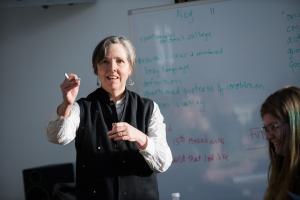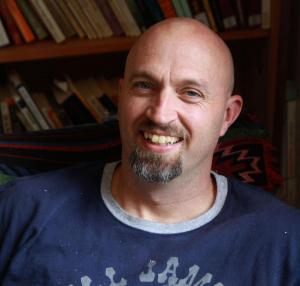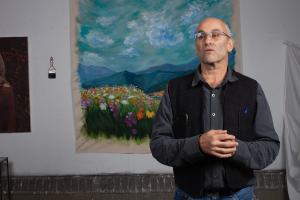Three Longtime Faculty Find New Horizons
Marlboro takes pride in how students find their passions through exploring new ideas and perspectives, and how the college’s interdisciplinary approach uniquely prepares them for new horizons. That is no less true for our faculty, three of whom are retiring this year to focus on new projects or directions inspired by their many years spent with Marlboro students and colleagues. Meg Mott (politics), John Sheehy (literature and writing), and John Willis (photography) will all be missed, but the community looks forward to seeing where their next steps take them.

“My favorite part about teaching at Marlboro has been the luxury and solace of teaching old books to a rambunctious group of young thinkers,” says Meg, who has taught politics since 1999. After 20 years, she will be finishing up with her last Plan students this year. “I will miss sitting on the wall in front of the dining hall and watching new and returning students take charge of the campus in September and October.”
In popular classes like Debating the American Dream and American Political Thought, Meg boldly blended constitutional law with political theory, two subfields of political science that often don’t have much overlap. She also launched an ambitious semester intensive titled Speech Matters, in fall 2017 and spring 2017, which dove deeply into reframing the debate on addiction and life after incarceration, respectively.
“Thanks to the curricular freedom afforded at Marlboro, I’ve been able to make connections between Machiavelli and Antonin Scalia, Madison and Sandra Day O’Connor,” Meg says. Her political expertise also extended from the classroom to Marlboro’s shared governance model, Community Court, and Town Meeting, where she often served as “parliamentarian.” “Marlboro gave me many opportunities to think out loud in public. Controversial discussions in Town Meeting always sharpened my thought process, and I am so grateful for my worthy opponents.”
Meg’s next adventure involves political theory, the Bill of Rights, and—wait for it—choral music. In the summer of 2017, she created a series called Debating Our Rights, which has run at the Putney Public Library and the Brooks Memorial Library in Brattleboro. The Vermont Humanities Council recently signed her on as one of their speakers, ensuring that the series will be touring around the state. In February 2020, she’ll be presenting on the 19th Amendment at the Vermont State House. “We begin with a look at the political theory behind each of the amendments, the Supreme Court interpretations, and the popular debates those decisions have spawned,” says Meg. What’s more, starting this fall, she’ll be collaborating with composer Neely Bruce of Wesleyan University, who has set the Bill of Rights to music.
“Neely works with community singers, and I lead workshops on the theory and interpretations of select amendments. We conclude with a public performance and discussion on these precious liberties. We are beginning with a performance/workshop in Augusta, Maine, on the First Amendment, and intend to hit each of the 50 states by 2024.” By that time, Meg also hopes to have finished and published her book in progress, Good Clash: The Art of Productive Disagreement. See her recent BCTV presentation on the subject at bit.ly/33qM2xc.
“The political theorist is committed to thinking outside the box or, as Plato might say, ‘thinking outside the cave,’” wrote Meg in a Spring 2016 Potash Hill editorial. The community can rest assured that Meg will remain ever vigilant in this regard, guiding the masses from the mind-numbing shadows of the machine.
• • •

“I liked that Marlboro gave me the freedom to teach what I wanted, when I wanted, and how I wanted,” says John Sheehy, who retired this fall after teaching literature and writing at the college since 1998. “I also liked the way teaching at Marlboro stretched me as a teacher, making me learn new things, and new approaches to old things. But, really, the students—Marlboro students are a joy.”
With titles like Apocalyptic Hope: The Literature of the American Renaissance and Tell about the South: The South in the American Literary Imagination, John’s literature seminars have covered everything from Faulkner to Emerson, Toni Morrison, Norman MacLean, and Cormac McCarthy. He loves books, and has an almost reverential regard for Moby Dick.
“When you teach a book, and this is true of many books that I love, there are many books that you can find the bottom of,” John said in a Fall 2014 Potash Hill interview. “You teach it once, you teach it twice, you teach it 10 times, and in the end of that you’ve found the edges of it, you know all of the things that are in it. And Moby Dick is not like that. I’ve been teaching it for 20 years and every time I teach it…there’s a bottom somewhere there but I haven’t found it. It’s a beautiful book.”
John explains that writing is an essential part of the learning process because it forces people to organize and present their thoughts with discipline, something people don’t always do when they are simply reading or talking about what they’ve read. For several years he led the Summer Writing Intensive, a weeklong workshop geared toward bringing together veterans as well as civilians through the art of writing, an experience he reflected on in a Chronicle of Higher Education editorial titled “Taking the Fight to the Page.”
It will come as no surprise to students in his Crime and Punishment class that John’s next move is going to law school, something he has contemplated since before his graduate work in literature. He’s not sure where it will lead, but has interests in public interest law, education law, or even going back to teaching.
“I’ve loved teaching legal writing, and would really love the opportunity to develop that as part of a pre-law curriculum somewhere,” says John. “We’ll see. For now, I’m kind of glad to be in the position of not knowing. It’s been a while since I didn’t know what tomorrow would look like.”
What John is certain of is that he will miss pretty much everything about Marlboro, especially teaching and the relationships he’s had with colleagues and, most of all, with students. “Marlboro has more or less made me who I am, so my time at Marlboro has helped inform this new adventure of mine in every conceivable way.”
• • •

Photography professor John Willis is also retiring after being at Marlboro for 29 years, having started as a part-time adjunct faculty in 1990. He actually first taught a class at the college in 1980, when he had just graduated from Evergreen State College and had moved to the area. Someone invited him to the sauna at Marlboro, and there he learned from students that they were working on building a darkroom but didn’t have a photography teacher. He gladly taught an Intro to Photography class in exchange for taking an art history class with Willene Clark.
“The photography program was started by students, just like the film program,” says John, who will continue working with Plan students for this academic year. “I had six students who worked like crazy for no credits, and we set it up in the science building with a darkroom in a mop closet. When I left there was enough interest that they started having part-time adjunct faculty.”
John has enjoyed teaching students who find interesting ways to combine fine arts photography with their other academic work, and has sponsored Plans that spanned the curriculum, from foreign languages to physics. He has challenged students to take photographs that comment on the images they capture, and sees the classroom as a place for constructive criticism.
“I’ve learned so much from the students doing Plans,” says John. “I love the interdisciplinary nature of Marlboro. Teaching the same class over and over, including basic things like ‘this is how a camera works,’ could be boring. What makes it really amazing and interesting is how each student comes to it differently and does different work.”
John is also well known for co-founding In-Sight Photography Project, a Brattleboro-based youth arts program that uses photography as a medium to empower young people to find their own creative voices. Working with five Marlboro Plan students he also co-founded Exposures, In-Sight’s cross-cultural youth arts program that brings participants together from Vermont, Pine Ridge Reservation in South Dakota, and other communities to expand artistic and cultural horizons.
In the coming years John is planning on focusing more on his own work, collaborating with other artists, and probably traveling. He and his wife, Pauline, a nurse, have talked about spending part of the year abroad, applying for Fulbright fellowships, and perhaps even joining the Peace Corps. John credits Marlboro with opening his eyes to the value of travel, having participated in faculty-led trips to Cuba, China, Japan, Cambodia, Pine Ridge Reservation, and the Navajo Nation.
“One way Marlboro affected my life was waking me up to the realization of how amazing the world is, and seeing different cultures and traditions,” says John. “That whatever I grew up thinking was normal is really a construct of my circumstances, and that it’s really helpful to get to know people from different circumstances.”
